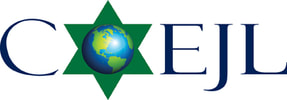Public Lands.
Most Jews are well acquainted with the concept of Tikkun Olam, “repairing the world.” This sacred mission—to work towards a more harmonious society—guides our pursuit of social justice.
In the Mishnah, Tikkun Olam is first found in the context of the phrase “mipnei tikkun ha-olam,” which can be translated as “in the interest of public policy.” The Mishnah stresses the importance of social policy legislation that is crafted to repair our world. Today, one of the few areas of policy that truly function in the spirit of Tikkun Olam is public lands.
In the book of Genesis, God created heaven and earth, land and water, plants and animals. And God looked at this creation—a world still pristine, wild, and pure—“and, behold, it was very good” (Genesis 1:31).
Very little of that world still exists, at least in the United States. We have civilized—and tyrannized—our land for our own purposes, creating massive cities and sprawling infrastructure where rolling hills and green forests once stood. We have beaten back God’s wildlands time and time again in the pursuit of wealth, natural resources, and recreational value.
In public lands, though, we still have places where God’s original creation is preserved. Our Jewish tradition demands that we consciously steward the earth and preserve the holiness of God’s creation. Opening up these lands to drilling, mining, or other excavation would very clearly betray that tradition and go against the Torah’s teaching not to destroy the land: bal tashchit (Deuteronomy 20:19–20).
We must recognize our land’s intrinsic worth—the inherent value of nature in its own right, without reference to its relationship with humans. Whereas nature’s economic value is forced to compete with other economic concerns like harvesting natural resources and creating jobs, nature’s intrinsic value is a God-given mandate that stands before the assertions of human activity.
We also must continue to protect our land, for God created it as God created us. Nature’s value is not for us to decide, because God’s world is very good (again, Genesis 1:31). Ensuring the health of our lands and waters is not a choice to make or an option to weigh. It is our duty as Jews.
Public lands belong to us all, and each of us has a responsibility to steward that land and to preserve it so future generations can bear witness to God’s creation.
Source: Noah Goldmann
In the Mishnah, Tikkun Olam is first found in the context of the phrase “mipnei tikkun ha-olam,” which can be translated as “in the interest of public policy.” The Mishnah stresses the importance of social policy legislation that is crafted to repair our world. Today, one of the few areas of policy that truly function in the spirit of Tikkun Olam is public lands.
In the book of Genesis, God created heaven and earth, land and water, plants and animals. And God looked at this creation—a world still pristine, wild, and pure—“and, behold, it was very good” (Genesis 1:31).
Very little of that world still exists, at least in the United States. We have civilized—and tyrannized—our land for our own purposes, creating massive cities and sprawling infrastructure where rolling hills and green forests once stood. We have beaten back God’s wildlands time and time again in the pursuit of wealth, natural resources, and recreational value.
In public lands, though, we still have places where God’s original creation is preserved. Our Jewish tradition demands that we consciously steward the earth and preserve the holiness of God’s creation. Opening up these lands to drilling, mining, or other excavation would very clearly betray that tradition and go against the Torah’s teaching not to destroy the land: bal tashchit (Deuteronomy 20:19–20).
We must recognize our land’s intrinsic worth—the inherent value of nature in its own right, without reference to its relationship with humans. Whereas nature’s economic value is forced to compete with other economic concerns like harvesting natural resources and creating jobs, nature’s intrinsic value is a God-given mandate that stands before the assertions of human activity.
We also must continue to protect our land, for God created it as God created us. Nature’s value is not for us to decide, because God’s world is very good (again, Genesis 1:31). Ensuring the health of our lands and waters is not a choice to make or an option to weigh. It is our duty as Jews.
Public lands belong to us all, and each of us has a responsibility to steward that land and to preserve it so future generations can bear witness to God’s creation.
Source: Noah Goldmann
